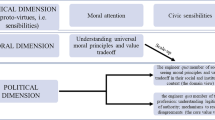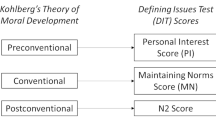Abstract
Should engineering ethics be taught? Despite the obvious truism that we all want our students to be moral engineers who practice virtuous professional behavior, I argue, in this article that the question itself obscures several ambiguities that prompt preliminary resolution. Upon clarification of these ambiguities, and an attempt to delineate key issues that make the question a philosophically interesting one, I conclude that engineering ethics not only should not, but cannot, be taught if we understand “teaching engineering ethics” to mean training engineers to be moral individuals (as some advocates seem to have proposed). However, I also conclude that there is a justification to teaching engineering ethics, insofar as we are able to clearly identify the most desirable and efficacious pedagogical approach to the subject area, which I propose to be a case study-based format that utilizes the principle of human cognitive pattern recognition.
Similar content being viewed by others
Notes
I do not wish to propose this characterization of “morality” as a formally comprehensive definition of the term. Nothing much of conceptual importance to the main thesis of this paper hangs on one’s inclination to refine or elaborate on the suggested characterization.
Professor Vesilind suggests that students can be taught to “think ethically” in much the same way that they can be taught to “think scientifically.”
The notion of applying paradigm cases to the resolution of moral dilemmas is certainly not a novel idea. Its application was revived, and its practicality defended, by Albert Jonsen and Stephen Toulmin some 20 years ago. While their defense of “casuistry” has not made significant impact among classical moral philosophers, it has been rather positively received in the area of bioethics and, I believe, deserves serious consideration in other areas of applied moral ethics as well.
I have become persuaded of the truth of this conclusion after many years of anecdotal observations in my own digital electronics courses.
References
Børsen Hansen, T. (2005). Teaching ethics to science and engineering students. Center for the philosophy of nature and science studies at the university of Copenhagen. http://portal.unesco.org/shs/en/files/8735/11289332261TeachingEthics_CopenhagenReport.pdf. Accessed March 18, 2009.
Bucciarelli, L. (2007). Ethics and engineering education. Workshop on philosophy and engineering at the technical university of Delft, Oct 27. http://dspace.mit.edu/bitstream/handle/1721.1/40284/ethics_20_talk.pdf?sequence=1. Accessed February 3, 2009. A shorter version of this paper is published in European Journal of Engineering Education, 33, 141–9.
Butler, J. C. (2009). The psychology of chess skill. http://www.chessville.com/misc/PsychologyofChessSkill.htm. Accessed April 15, 2009.
Chase, W. G., & Simon, H. A. (1973). The mind’s eye in chess. In W. G. Chase (Ed.), Visual information processing pp. 215–281. New York: Academic Press.
Cruz, J. A., Frey, W. J., Sanchez, H. D., Torres, M.A., et al. (2004). Meeting the ethics challenge in engineering education: Re-accreditation and beyond. In 34th ASEE/IEEE frontiers in education conference, October 20–23, Savannah, Ga. http://fie-conference.org/fie2004/papers/1195.pdf. Accessed 18 Mar 2009.
Daniel, A. (2007). Walking the line. ASEE Prism, 17. http://www.prism-magazine.org/oct07/tt_01.cfm Accessed Mar 23, 2009.
Daugherty, J., & Mentzer, N. (2008). Analogical reasoning in the engineering design process and technology education applications. Journal of Technology Education, 19, 7–21.
Davis, M. (1993). Ethics across the curriculum: Teaching professional responsibility in technical courses. Teaching Philosophy, 16, 205–235.
Davis, M. (1994). Ethics across the curriculum. Perspectives on the Professions, 13. http://ethics.iit.edu/perspective/pers13_2feb94_1.html. Accessed 9 Mar 2009.
Davis, M. (2006a). Engineering ethics, individuals, and organizations. Science and Engineering Ethics, 12, 223–231.
Davis, M. (2006b). Teaching ethics across the engineering curriculum. In Online Ethics Center for Engineering, National Academy of Engineering. http://www.onlineethics.org/CMS/edu/instructessays/curriculum.aspx. Accessed 23 March 2009.
Harris, C. E. Jr., Davis, M., Pritchard, M. S. Rabins, M. J., et al. (1996). Engineering ethics: What? why? how? and when? Journal of Engineering Education, April, 93.
de Groot, A. D. (1965). Thought and choice in chess. The Hague: Mouton Publishers.
Dewey, J. (1944). Democracy and education. New York: The Free Press.
Dreyfus, H. L., & Dreyfus, S. E. (1986). Mind over machine: The power of human intuition and expertise in the era of the computer. New York: The Free Press.
Frantz, R. (2003). Herbert Simon. Artificial intelligence as a framework for understanding intuition. Journal of Economic Psychology, 24, 265–277.
Gentner, D. (2002). Analogical reasoning, psychology of encyclopedia of cognitive sciencevol. 1, pp. 106–112. London: Nature Publishing Group.
Gobet, F. (2009). Role of pattern recognition and search in expert decision making. http://www.cogsci.northwestern.edu/cogsci2004/papers/paper152.pdf Accessed 16 Apr 2009.
Gorman, M.E. (2001–2002). Turning students into ethical professionals. IEEE Technology and Society Magazine, 20, 21–7.
Harris, C. E., Jr., Pritchard, M. S., & Rabins, M. J. (2009). Engineering ethics: concepts & cases. Belmont, CA: Wadsworth.
Hashemian, G., & Loui, M. C. (2005). Can instruction in engineering ethics change students’ feelings about professional responsibility? In 35th ASEE/IEEE frontiers in education conference, Indianapolis, Indiana, October 19–22. http://netfiles.uiuc.edu/loui/www/engcourage.pdf. Accessed March 23 2009.
Holyoak, K. J., Gentner, D., & Kokinov, B. N. (2001). The place of analogy in cognition. In D. Gentner, K. J. Holyoak, & B. N. Kokinov (Eds.), The analogical mind: Perspectives from cognitive science 1–19). Cambridge, MA: The MIT Press.
Jain, A. K., & Duin, R. P. W. (2004). Pattern Recognition. http://www.answers.com/topic/pattern-recognition Accessed April 17 2009.
Kaufman, D. M. (1998). Problem-based learning: Using cases to teach about how to deal with ethical problems. NCEHR-CNERH Communiqué, 8. http://www.ncehr-cnerh.org/english/communique2/PBLearning.htmlAccessed March 23 2009.
Kolodner, J. (1993). Case-based reasoning. San Mateo, CA: Morgan Kaufmann.
Leake, D. B. (1996). Case-based reasoning: Experiences, lessons, and future directions. Cambridge, MA: AAAI Press/MIT Press.
Lovrin, N., & Vrcan, Z. (2009). Some considerations about engineering ethics. Strojarstvo, 51, 239–248.
Meyers, C., & Jones, T. B. (1993). Promoting active learning: Strategies for the college classroom. San Francisco, CA: Jossey-Bass.
Pell, E. J. (2001). The road to success in research and scholarship must be paved with integrity and responsibility: Not just good intentions. Address to the graduate school convocation at Penn State University. http://www.research.psu.edu/about/address2001.html Accessed 23 March 2009.
Richards, L. G., & Gorman, M. E. (2004). Using case studies to teach engineering design and ethics. In Proceedings of the 2004 American society for engineering education annual conference and exposition (on CD).
Shapiro, B. P. (1984). An introduction to cases. Boston, MA: Harvard Business School.
Stephan, K. (2001-–2002). Is engineering ethics optional? IEEE Technology and Society Magazine, 20, 9.
Vesilind, P. A. (1988). Rules, ethics and morals in engineering education. Engineering Education, , 78, 289–293.
Whitbeck, C. (2006). Teaching ethics to scientists and engineers: Moral agents and moral problems. Online Ethics Center for Engineering, National Academy of Engineering. http://www.onlineethics.org/CMS/edu/instructessays/teaching.aspx Accessed 23 Mar 2009.
Author information
Authors and Affiliations
Corresponding author
Rights and permissions
About this article
Cite this article
Abaté, C.J. Should Engineering Ethics be Taught?. Sci Eng Ethics 17, 583–596 (2011). https://doi.org/10.1007/s11948-010-9211-9
Received:
Accepted:
Published:
Issue Date:
DOI: https://doi.org/10.1007/s11948-010-9211-9




